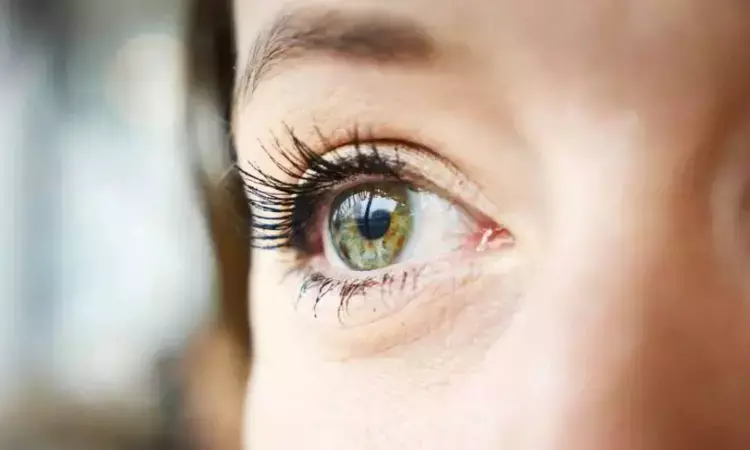- Home
- Medical news & Guidelines
- Anesthesiology
- Cardiology and CTVS
- Critical Care
- Dentistry
- Dermatology
- Diabetes and Endocrinology
- ENT
- Gastroenterology
- Medicine
- Nephrology
- Neurology
- Obstretics-Gynaecology
- Oncology
- Ophthalmology
- Orthopaedics
- Pediatrics-Neonatology
- Psychiatry
- Pulmonology
- Radiology
- Surgery
- Urology
- Laboratory Medicine
- Diet
- Nursing
- Paramedical
- Physiotherapy
- Health news
- Fact Check
- Bone Health Fact Check
- Brain Health Fact Check
- Cancer Related Fact Check
- Child Care Fact Check
- Dental and oral health fact check
- Diabetes and metabolic health fact check
- Diet and Nutrition Fact Check
- Eye and ENT Care Fact Check
- Fitness fact check
- Gut health fact check
- Heart health fact check
- Kidney health fact check
- Medical education fact check
- Men's health fact check
- Respiratory fact check
- Skin and hair care fact check
- Vaccine and Immunization fact check
- Women's health fact check
- AYUSH
- State News
- Andaman and Nicobar Islands
- Andhra Pradesh
- Arunachal Pradesh
- Assam
- Bihar
- Chandigarh
- Chattisgarh
- Dadra and Nagar Haveli
- Daman and Diu
- Delhi
- Goa
- Gujarat
- Haryana
- Himachal Pradesh
- Jammu & Kashmir
- Jharkhand
- Karnataka
- Kerala
- Ladakh
- Lakshadweep
- Madhya Pradesh
- Maharashtra
- Manipur
- Meghalaya
- Mizoram
- Nagaland
- Odisha
- Puducherry
- Punjab
- Rajasthan
- Sikkim
- Tamil Nadu
- Telangana
- Tripura
- Uttar Pradesh
- Uttrakhand
- West Bengal
- Medical Education
- Industry
TearCare Therapy Demonstrates Long-lasting Efficacy Against Meibomian Gland Dysfunction

A recent study published in Optometry and Vision Science suggests that a single TearCare treatment effectively reduces both the symptoms and signs of Meibomian Gland Dysfunction (MGD) and maintains its effects for up to 12 months. MGD is a common eye condition that can cause a range of uncomfortable symptoms, including dryness, redness, and irritation. Effective treatment options have been sought after to alleviate this condition by Thomas Chester and team.
Conducted at a single-center ophthalmology/optometry practice, the study aimed to determine how long the benefits of TearCare treatment last. TearCare involves controlled heating of the meibomian glands using SmartLids combined with manual expression of liquefied meibum by a physician. The research involved a retrospective analysis of data from 78 patients and evaluated both symptom relief and gland function.
Symptoms were assessed using the Standard Patient Evaluation of Eye Dryness Questionnaire (SPEED), while gland function was assessed using the meibomian gland expression (MGE) scores. Data was collected at multiple time points: 8 weeks, 6 months, 12 months, and 18 months after treatment. The study also explored the effectiveness of TearCare across different subgroups, such as age, race, and sex.
The findings of the study were promising. The mean baseline SPEED score, which was 14, decreased significantly to 7.9 at eight weeks post-treatment. Impressively, the improvement in symptom relief was maintained at 6 months (7.7) and 12 months (7.9). However, at 18 months, there was a slight increase to 8.9, indicating some regression in symptom relief.
Gland function, as measured by the MGE score, also showed significant improvement. At baseline, the mean MGE was 4.9 in the right eye and 4.8 in the left eye. After eight weeks of TearCare treatment, the mean MGE score increased to 9.0 in both eyes, demonstrating a substantial improvement. This improvement was sustained at 6 months and 12 months, with scores of 8.6 and 7.8, respectively. At 18 months, there was a slight decline in the MGE score, with values of 6.8 in the right eye and 7.0 in the left eye.
Source:
Chester, T., Ferguson, T., & Chester, E. (2023). Localized Heat Treatment for Meibomian Gland Dysfunction: A Single Center Retrospective Analysis of Efficacy over Time. In Optometry and Vision Science. Ovid Technologies (Wolters Kluwer Health). https://doi.org/10.1097/opx.0000000000002053
Neuroscience Masters graduate
Jacinthlyn Sylvia, a Neuroscience Master's graduate from Chennai has worked extensively in deciphering the neurobiology of cognition and motor control in aging. She also has spread-out exposure to Neurosurgery from her Bachelor’s. She is currently involved in active Neuro-Oncology research. She is an upcoming neuroscientist with a fiery passion for writing. Her news cover at Medical Dialogues feature recent discoveries and updates from the healthcare and biomedical research fields. She can be reached at editorial@medicaldialogues.in
Dr Kamal Kant Kohli-MBBS, DTCD- a chest specialist with more than 30 years of practice and a flair for writing clinical articles, Dr Kamal Kant Kohli joined Medical Dialogues as a Chief Editor of Medical News. Besides writing articles, as an editor, he proofreads and verifies all the medical content published on Medical Dialogues including those coming from journals, studies,medical conferences,guidelines etc. Email: drkohli@medicaldialogues.in. Contact no. 011-43720751


